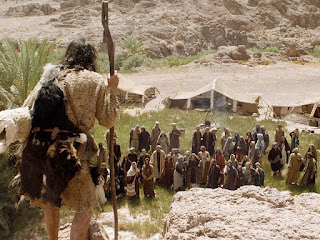The time has come for all barriers to come down, all hatreds to disappear, and all hostilities among the nations to vanish.
“Rise up in splendor, Jerusalem! Your light has come, the glory of the Lord shines upon you…Raise your eyes and look about; [the nations] all gather and come to you” (Is 60:1, 4).
At a time when Israel’s survival as a nation is threatened by the collapse of the kingdom of Israel in the north and the invasion of Jerusalem by Sennacherib, the king of Assyria, in the south, Isaiah’s message of hope that extolls the splendor of Jerusalem and its glorious future must have sounded more like a mockery than an encouragement to its people. But with the benefit of hindsight and the enlightenment of history, now we know his prophecy is in fact so accurate that it strains credulity.
With a laser-sharp futuristic vision, the prophet foresees in this Sunday’s first reading a New Jerusalem upon which “the glory of the Lord shines” (Is 60:1). Gone was the city of Jerusalem, sacked and destroyed by the Romans in 70 A.D; its residents, more than one million of them according to the Jewish historian Josephus, massacred or left to die from famine. Appearing on the world stage of history, not as a replacement but as a continuation, was the Church, the New Jerusalem (CCC 756). Gone also was the Jerusalem temple, razed to the ground, not one stone was left upon another as Jesus had predicted (cf. Lk 21:6). With the temple demolished, all but inevitable was the abrupt termination of the Mosaic sacrifices and Aaronic priesthood. The sacred duties of worship and sanctification of the temple have been taken over and continued until this day by the Church, the New Jerusalem Temple, through its divine liturgies, Christ-centered sacraments, and Petrine priesthood.
Never should we be taken aback by the “spot or wrinkle or any such thing” that we see in the Church every so often (Eph 5:27). We say this without minimizing the seriousness of the consequences that endanger Peter’s boat whenever the Church falls short (cf. Lk 8:22-23). If life to us is a process of learning and striving for excellence, history to the Church, the New Jerusalem, is a process for it to progress and spiral towards perfection. The Church, often referred to as the Holy City, is undergoing purification; it will be made “holy and without blemish” by Christ (CCC756, Eph 5:27). “As living stones we here on earth are built into it”, until the world is made anew and the New Jerusalem “[comes] down out of heaven from God, prepared as a bride adorned for her husband” (CCC756, Rev 21:2).
The New Jerusalem envisioned by Isaiah is also for all nations: “Nations shall walk by your light…they all gather and come to you” (Is 60:3-4). While unthinkable to the Jews at the time who shunned the Gentiles because they were considered “unclean”, the prophecy is perfectly fulfilled in the Catholic Church. “Catholic”, a word first used by St. Ignatius of Antioch (d. 108 AD), means universal or for all nations. St. Paul refers to this important attribute of the Church as “the mystery [that] was made known to me by revelation” in the second reading (Eph 3:2). In this mystery of the universality or catholicity of the kingdom of God: “the Gentiles are coheirs, members of the same body, and copartners in the promise in Christ Jesus through the gospel” (Eph 3:6).
Now we know why the Church concludes this Sunday’s readings with Matthew’s gospel account on the visit of the three wise men. After many years of preparation, prophecy, and anticipation; after a lengthy labor and many painful birth pangs; history has given birth, in this “infant wrapped in swaddling clothes and lying in a manger”, to the world’s savior (Lk 2:12). He will reconcile all things, “making peace by the blood of his cross, whether those on earth or those in heaven” (Col 1:20). The time has come for all barriers to come down, all hatreds to disappear, and all hostilities among the nations to vanish. So here they come: three wise men from the east, representing the Gentile nations; paying tribute to the new born King; bringing with them “gifts of gold, frankincense, and myrrh” in recognition of his Kingship, Divinity, and Passion; just as Isaiah has envisioned (Mt.2:11, Ignatius Catholic Study Bible).













